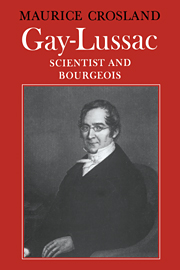Book contents
- Frontmatter
- Contents
- Preface
- Chronological table
- List of abbreviations
- 1 A young provincial in Paris
- 2 The apprentice of Arcueil
- 3 Personal influences and the search for laws
- 4 Collaboration and rivalry
- 5 The volumetric approach
- 6 Scientific research
- 7 Professor, Academician and editor
- 8 A scientist in the service of government and industry
- 9 A new technique and the dissemination of technical information
- 10 Scientist and bourgeois in the political arena
- 11 The legacy
- Appendix: select correspondence
- Notes
- Select bibliography
- Name index
- Subject index
- Frontmatter
- Contents
- Preface
- Chronological table
- List of abbreviations
- 1 A young provincial in Paris
- 2 The apprentice of Arcueil
- 3 Personal influences and the search for laws
- 4 Collaboration and rivalry
- 5 The volumetric approach
- 6 Scientific research
- 7 Professor, Academician and editor
- 8 A scientist in the service of government and industry
- 9 A new technique and the dissemination of technical information
- 10 Scientist and bourgeois in the political arena
- 11 The legacy
- Appendix: select correspondence
- Notes
- Select bibliography
- Name index
- Subject index
Summary
‘I should place him [Gay-Lussac] at the head of the living chemists of France’
Humphry Davy‘one of the first [natural] philosophers of the age’
J. F. DaniellThe name of Gay-Lussac is remembered in many ways. His work on the density of alcohol–water mixtures is perpetuated in the ‘degrees Gay-Lussac’, which in France have come to replace the medieval ‘degrees proof’ as a means of describing the strength of alcoholic drinks. The ‘Gay-Lussac tower’ was the name given to a vital part of the manufacture of sulphuric acid in recognition of Gay-Lussac's contribution to this industry. The scientist's name is associated with a type of barometer and a burette. He is also commemorated in the mineral ‘Gay-Lussite’ and in Gaylussacia, the botanical name for the huckleberry. Perhaps Gay-Lussac himself would have derived most satisfaction from being remembered above all as the man who formulated two fundamental laws of nature. If his own scrupulous acknowledgement of unpublished antecedents has meant that his law of the thermal expansion of gases is now more generally known as ‘Charles' law’, at least his discovery of the regularity in the ratio of the volumes of combining volumes of gases is still appropriately known, and learned by every elementary student of chemistry as ‘Gay-Lussac's law’. Yet he is so little known as a man that he is listed in the British Library catalogue – a source of international repute – as Gay-Lussac, Nicholas François, although his Christian names were indisputably Joseph Louis.
- Type
- Chapter
- Information
- Gay-LussacScientist and Bourgeois, pp. ix - xiiiPublisher: Cambridge University PressPrint publication year: 1978



